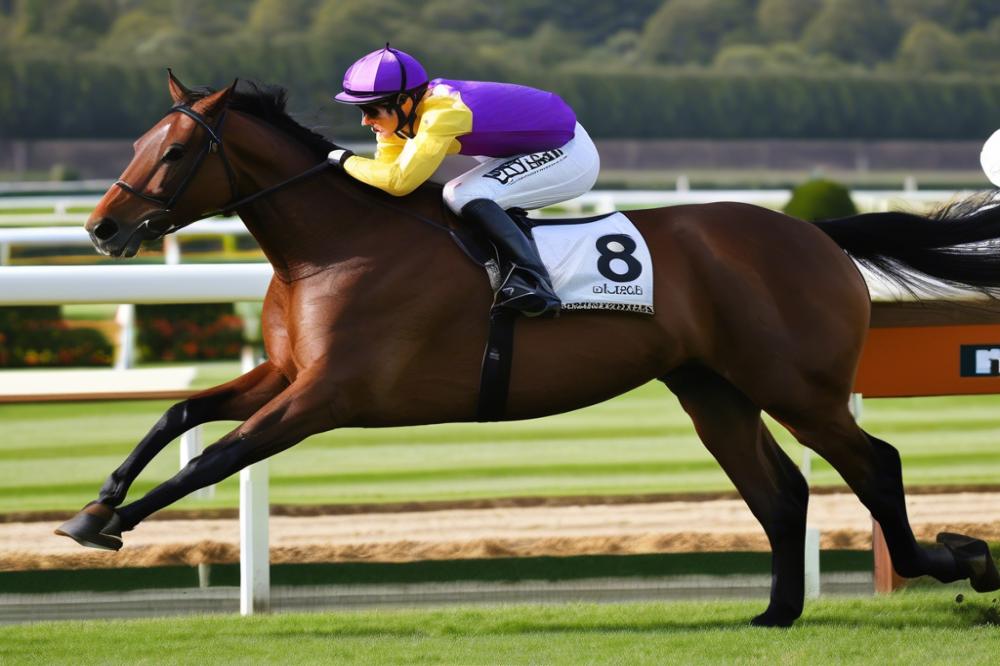The Significance of Racehorse Names
Choosing a name for a racehorse might seem like a simple task, but it’s anything but. A name carries weight, much like the saddles for thoroughbreds that help guide them down the track. The right name can evoke excitement and capture attention, not only to the horse’s owners but also to fans and bettors. Imagine the thrill of yelling out a horse’s name as it bolts down the stretch—it becomes a part of the racing experience. Equine names aren’t just labels; they can tell a story and reflect the horse’s lineage, personality, or even its future potential on the racetrack.
Racing Culture and Traditions
In the world of horse racing, naming conventions have their own set of traditions. The racing culture is rich and colorful, with each name often steeped in meaning. From names inspired by historical figures to quirky phrases that make fans chuckle, the creativity knows no bounds. Some owners might pick a name that speaks to their passion, like “Galloping Gourmet” for a foodie or “Quick Wit” for those who appreciate a good pun. These unique creations not only serve as horse identification but also spark conversations among spectators. A memorable name will linger long after the race is over.
Marketability and Brand Building
On another note, racehorse names can have a significant impact on branding and marketing efforts. A catchy name can turn an ordinary horse into a superstar in the eyes of the public. Owners know that a strong name can attract fans and motivate bettors. If a horse has a name that resonates or sticks in people’s minds, it may lead to merchandise sales or even social media buzz surrounding its races. Imagine a horse named “Thunderbolt Fury” racing alongside “Whispering Dream”—which one do you think would be more memorable? The right name can transform a simple horse into a brand, creating a lasting presence in the racing world.
Additionally, the journey of picking horse names ideas can be an adventure in itself. Many owners solicit suggestions from friends and family, hoping to uncover that perfect gem that embodies their horse. From brainstorming sessions at lunch to late-night name suggestions over cups of coffee, the process can become a delightful aspect of horse care. Whether the final choice reflects the horse’s temperament, speed, or even a beloved pet from childhood, it becomes a personal connection for the owner. These names often evoke laughter and warm memories, adding another layer to the bond between horse and human.
As we explore the fascinating world of racehorse names, it’s essential to recognize how these titles shape the identity of each horse. They become part of a legacy, much like the best vitamins for horses that help keep them healthy and strong. Ultimately, each name is a small piece of a larger puzzle in the vibrant world of horse racing.
The Basics of Racehorse Naming

Rules and Regulations Regarding Naming
Horse naming isn’t as simple as throwing any old name to your companion. There are specific rules that breeders, owners, and trainers need to follow. The Jockey Club, which oversees a lot of racing, plays a big part in this. They want to keep things organized, just like a smart librarian sorting books. To get approved, a name must be fitting and adhere to their guidelines.
Length and Character Restrictions
When it comes to length, racehorse names can’t be too short or too long. Typically, names can be up to 18 characters long, including spaces. Imagine trying to fit “Thunderous Race-Chaser” into that tiny box! No one wants to say a name that feels like a tongue twister. Character restrictions also come into play. Special characters or numbers are usually off-limits. This requirement makes horse names easier to read during races. Clear identification is key for everyone involved.
Restrictions on Duplicate Names
No one likes to feel lost in a sea of sameness. In the world of horse identification, uniqueness is vital. That’s why two horses cannot have the same name. It can get confusing if two “Lightning Bolts” raced against each other! The Jockey Club keeps a database, kind of like a Hall of Fame, to check for duplicate names. Owners must pick something fresh and original. It’s like trying to come up with a fun and clever nickname while avoiding every boring option.
Getting creative is half the fun. There are plenty of horse names ideas floating around for those who need a little inspiration. Some owners draw from personal experiences, while others might look to their favorite books or movies. Just like naming a pet, finding the perfect name takes a little thought, imagination, and sometimes, a good laugh.
Sources of Inspiration for Names

Common themes and categories
When naming a racehorse, imagination plays a huge role. Some names come from history. Others draw inspiration from nature. Think of gorgeous landscapes, like mountains and rivers, as a source. Colors can even help. Names like “Blue Thunder” evoke images of a stormy sky.
Personal stories often guide horse naming too. Many owners choose names that reflect their own lives or loved ones. It’s common to see horses named after family members or cherished pets. In this way, the horse becomes part of a story, not just another competitor.
Names also sometimes hint at a horse’s personality. A horse that runs wild might be named “Firecracker.” Meanwhile, a calm horse could go by “Gentle Spirit.” Every name tells a story, and that story connects to the horse’s journey on the racetrack.
Famous racehorses and their names
Every racing fan knows names like “Secretariat” and “Seabiscuit.” These legends made their mark, not only for their speed but also their titles. “Secretariat” stands out as a regal name, fitting for a champion. It reflects grace and power. Then there’s “Seabiscuit,” which sounds more like a cozy, lovable pet. This shows how names set the tone for a horse’s personality and public image.
Sometimes, racehorse names hint at the horse’s background. “American Pharoah” is a nod to its heritage while also drawing in fans. Such horse names ideas often tell a story before the races even begin. This sparks the audience’s curiosity and boosts excitement.
Literature, mythology, and pop culture influences
Many owners take cues from books, movies, and myths when coming up with equine names. Greek and Roman mythology is rich with characters who inspire. Names like “Pegasus” or “Achilles” can add a sense of grandeur to a gallant horse.
Look at popular culture for more ideas. Characters from films or songs can make catchy names. Naming a horse “Hannibal” could invoke an image of strength and strategy. Additionally, names inspired by famous stories often resonate with fans, creating a deeper connection.
When owners use literature or famous tales, they bring some of that magic to the racetrack. A well-chosen name can light up the crowd and add to the thrill of competition. So, keep an eye on the latest hits or classic tales; they might just spark an idea for the next big champion!
The Role of Breeders and Owners in Naming

How Breeders Choose Names for Their Horses
Breeders play a big role in how horses get their names. They often look at the horse’s lineage and pedigree, searching for inspiration. Some might pick names based on the horse’s parents, wanting to honor their history. Likewise, others might use names related to a special event or moment in their lives. A good name can reflect the horse’s character, too. A playful colt might get a fun name, while a serious filly could end up with something elegant. The naming process isn’t just about creativity; it also involves following certain rules. The Jockey Club has specific guidelines to keep things consistent.
Influence of Owners in the Naming Process
After breeders have a good idea, owners step in with their own thoughts. Owners often want to put their personal touch on the name. Some might want a name that has a connection to their family or a hobby. Others could be looking for something that stands out in the racing world. Names that are catchy or funny might catch their attention. Imagine a horse named “Galloping Gourmet” or “Biscuit Bandit”! Owners also need to think about how the name will look on the back of a jacket or on race day programs. Each owner might bring their dreams and stories to the table when picking a name.
Tips for Horse Naming
When thinking of horse names ideas, creativity is key. A playful approach can lead to memorable names. Exploring different themes could be fun too. Nature, colors, or even famous people can spark many ideas. Owners should also consider being unique without being too complicated. A name that’s too long can be hard to remember or shout at the track! Funny names often leave a lasting impression. Humorous choices can bring a smile to everyone’s face, even during tough competitions. It’s amazing how much thought goes into these equine names, isn’t it?
The Naming Process
Submitting Names to Racing Authorities
When it comes to horse naming, the first step involves submitting suggestions to the racing authorities. Owners often come up with ideas that reflect the horse’s personality or history. Submissions usually happen through an online form. You might think creativity will lead to a catchy name, but that’s not all there is to it. The horse’s name needs a little flair but also must be suitable. Most racing organizations have guidelines to follow, so it’s wise to read the rules before diving in.
The Approval Process for Racehorse Names
Once a name is submitted, the waiting begins. Racing authorities review each suggestion with meticulous care. They check for duplicates or similar names already in use. Hopefully, the chosen name isn’t too close to another, or it could be tossed out the window! Owners may find themselves playing a game of name roulette. An approved name might be joyous news, while a rejection can lead to panic. If they get denied, owners must think outside the box and come up with fresh ideas.
Consequences of Name Rejection and Renaming
Rejection can be quite the headache for horse owners. New horse names must still fit within certain criteria. Getting a name turned down might feel like a punch in the gut. Yet, the process isn’t all doom and gloom. Owners often grasp this as an opportunity to brainstorm. Maybe the horse’s quirks inspire an even better name! Funny anecdotes and puns can lead to some clever horse names ideas. It’s a chance for creativity to shine bright.
Sometimes, re-naming can become an exciting adventure. Owners might involve friends or family in the voting process. Everyone loves a good horse identification party! It can be a lighthearted way to ease the stress of the rejection. As you can see, naming these magnificent animals requires thoughtfulness and a sprinkle of fun. After all, an equine’s name can leave a lasting impression long after it gallops away.
The Impact of Racehorse Names on Success
Ever wonder how much a name can influence a horse’s success? It might surprise you to learn that names matter—especially in the world of racing. A catchy name can stick in people’s minds, making it easier to root for a horse. For instance, when fans shout for their favorite equine athlete, a memorable name makes it all the more thrilling. Imagine cheering for a horse called “Thunder Roar” versus one named “Horse 27.” Which one do you think would sound more exciting?
How a Name Can Influence Public Perception
Names can shape how fans perceive a horse. Some names evoke strength, speed, or grace. Others might bring to mind fun or mischief. Take “Seabiscuit,” for example. This name is lively and spirited, perfectly matching the horse’s fiery approach to racing. Owners and trainers often need to think carefully when horse naming. A great name can create buzz, drawing attention to the horse even before it starts running.
Examples of Successful Horses with Memorable Names
Many legendary racehorses owe part of their fame to their catchy names. “Secretariat” is a classic. Few can forget the smooth, elegant sound of it. His name matched his winning streak and made him a household name. Then there’s “American Pharoah,” another horse whose name sparked curiosity. People remembered him not only for his amazing performances but also for that cool twist on a common word. Names like these help create a persona that fans love.
The Psychology Behind Racehorse Naming
There’s some interesting psychology at play with horse names. People often judge things based on first impressions. A name can evoke emotions, forming a connection before the race even starts. It’s similar to how people might think differently about a car named “Speed Demon” versus “Family Sedan.” The right name can create excitement and anticipation. When brainstorming horse name ideas, owners tap into what emotions they want to evoke. Sometimes, the wackiest names attract the most attention. Picture a horse called “Dancing on Rainbows.” Who wouldn’t want to cheer for that?
Ultimately, the world of racehorse names is a blend of creativity and strategy. The right name can enhance the reputation of a horse, leading to greater success on the track. So next time you watch a race, pay attention not just to the horses but also to the stories behind their names. You might find a greater appreciation for the artistry involved in horse naming!
Cultural Considerations in Racehorse Naming
How Names Reflect Cultural Heritage
Names for racehorses often tell stories. They can reveal a lot about the culture from which they come. For example, in some countries, names might celebrate important historical figures or local legends. An Arabian horse might get named after a famous poet, while an American thoroughbred may sport a name that honors a sports hero. Each name holds meaning. Just like a song can remind you of a moment in time, a horse’s name can connect to pride in a heritage.
Regional Differences in Naming Conventions
Naming horses is not the same everywhere you go. In Europe, names might follow strict rules. A horse may need to have a certain theme, or it might need to start with specific letters based on its lineage. In Australia, names could reflect the wild, free spirit of the countryside. Think of “Outback Ranger” or “Bushwalker.” In other regions, horse names may take inspiration from local languages, flora, or fauna. This variation makes horse naming a colorful topic. Each region puts its own twist on horse care and identity.
Case Studies from Different Countries
One might find that Japan has a unique approach. Japanese racehorse names often draw from nature. You might see a name like “Cherry Blossom Wind.” Contrast this with the playful names seen in the U.S. “Running on Empty” might catch your eye on a race card. Even within the same country, culture can influence trends. Some owners choose horse names ideas based on pop culture references or quirky inspirations. It’s fascinating how these names provide insight into what’s valued in different societies.
People get creative with equine names for all sorts of reasons. Some prefer building a strong sense of identity through names. Others may look to honor family members or cherished pets. When it comes to racehorse names, the sky is the limit. There’s always a story waiting to be told behind every single one.
Final Thoughts on the Art of Naming Racehorses
In the world of racing, a name isn’t just a label; it’s a powerful part of a horse’s identity. Choosing the right name carries significance that goes beyond mere words. Owners, trainers, and fans alike understand that the name can conjure images, evoke emotions, and even set expectations for a horse’s achievements. A name like “Thunderbolt” implies speed, while “Gentle Breeze” might suggest a more graceful presence. Each name, whether quirky or noble, adds to the rich tapestry of this sport.
Naming a racehorse involves a blend of creativity and strategy. Some may think it’s as simple as picking a favorite snack or a beloved family member, but there’s more behind the curtain. It takes a keen understanding of the horse’s characteristics, desired image, and sometimes even a sprinkle of luck. Horse owners are often seen brainstorming over coffee or in the stables, tossing around ideas like children playing catch. Will it be a pun? A reference to history? Perhaps even an homage to a beloved pet? These conversations can lead to some very amusing moments. Just imagine the cameos in a stable if the name “Do Horses Sit Down” was thrown into the mix!
As the day approaches for those who are looking to welcome a new horse into their lives, it helps to remember the importance of a good name. One way to organize your thoughts is to use a horse due date calculator. It can help track your horse’s progress, but also be a reminder of all the surrounding excitement.
Owning a horse is a commitment, and every detail counts, from feeding to grooming to, of course, naming. It’s a chance to express creativity, start a tradition, or even play a part in this storied industry. Therefore, when you find yourself lost in choosing a name, remember: it should reflect the spirit of the horse, resonate with you, and ultimately stand out in the racing crowd.
In essence, naming may appear simple, but it is layered with depth and significance. So, whether you’re a long-time enthusiast or a newcomer to the ranks, take the time to enjoy the art of naming. After all, a delightful name can forge an endearing bond that lasts far beyond the racetrack. Happy naming, and may your choices gallop into greatness!



